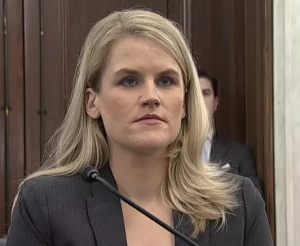 Two mothers from Kentucky have filed lawsuits against Instagram’s parent company, Meta, claiming that the app targeted their daughters with images and posts that led to eating disorders and suicide attempts.
Two mothers from Kentucky have filed lawsuits against Instagram’s parent company, Meta, claiming that the app targeted their daughters with images and posts that led to eating disorders and suicide attempts.The Daily Mail is reporting on the suits filed by Candace Wuest and Jennifer Martin which claim that the company’s algorithm barraged their daughters with images of skeletal models and calorie-restrictive recipes that led to anorexia, self-harming, and suicide attempts.
In Wuerst’s case, her daughter, known in the legal papers as CN, was only 12 years old when her social media activity began to make her preoccupied with wanting to be thin. She joined Instagram groups that shared tips on how to avoid eating.
As a result of the algorithm, her Instagram page became “flooded with images of excessively thin models, focusing on thigh gaps, bridge gaps, and clavicle bones,” the lawsuit states. “These are not terms CN searched for but, rather, content Meta’s recommendation system sent to her. CN would open her Explore page and the content was simply there, in mind blowing volumes.”
In 2018, CN’s periods stopped. Even though she hid this from her mother, she shared it with her Instagram friends who congratulated her on doing “something right.”
Later that year, she nearly fainted while shopping with her mother which is what eventually led to four years of repeated hospitalizations during which time CN attempted to kill herself twice. Even while hospitalized she refused to eat and had be fed through a tube in order to keep her alive. And when she tried to eat, she suffered so much anxiety and guilt that she would engage in self-harm.
 “To this day, her arms, stomach, legs and ankles are scarred with those markings of suicidal ideation and self-injury. Her honor roll status and dreams for her future became a distant memory. Her eating disorder resulted in significant loss of muscle and parts of her brain.”
“To this day, her arms, stomach, legs and ankles are scarred with those markings of suicidal ideation and self-injury. Her honor roll status and dreams for her future became a distant memory. Her eating disorder resulted in significant loss of muscle and parts of her brain.”
The Wuerst family is seeking unspecified damages from a jury trial.
Alexandra “Alex” Martin’s story is not much better. According to her parents, Alex was perfectly happy with her figure until she started using the app. After being bombarded by images of beautiful models with perfect bodies, she quickly shed 20 pounds.
She was soon exposed to “massive amounts of eating disorder and unhealthy content” the suit claims, and began receiving advice from “pro-ana” groups (the name for groups that promote anorexia).
“Alex started by eating healthier, then eating less and exercising more, fueled on by the images that Meta's algorithm bombarded her with in the Feed, Stories and Explore. She began thinking that she wasn't good enough, and that she needed to look like the models she saw on Instagram,” the suit continues.
Posting her own photos made her depressed and afraid her friends wouldn’t “like” them, and slowly started to withdraw altogether.
“She went through phases of depression and her exercise routine became more and more extreme. At the same time, she started to eat less, which is when her parents realized something was going on. Alex would make up that she had eaten that day, so her parents didn't worry. She would take food out of wrappers and hide the food at the bottom of the garbage can, while putting the empty wrappers at the top. She would pretend to eat dinner with her family, but then spit into her napkin and feed it to the family's dogs.”
 When she dieted herself down to 90 pounds, her parents took her to the emergency room where they discovered that her resting heart rate was in the 20’s. They were told their daughter was in heart failure.
When she dieted herself down to 90 pounds, her parents took her to the emergency room where they discovered that her resting heart rate was in the 20’s. They were told their daughter was in heart failure.
She was diagnosed with anorexia and spent 21 days in the hospital where she continued to refuse to eat. She spent 21 days in the hospital, during which time she was diagnosed with anorexia.
“No matter how hard she tried, she could not stop comparing herself to the images Instagram's algorithm promoted, applied, and bombarded her with, which she had come to think of as the norm and the way she was supposed to look,” the suit claims.
In May of 2019, she attempted suicide by overdosing on pills and was hospitalized for 10 days, then transferred to a psychiatric ward.
These are just two examples of a dozen similar lawsuits that have been filed against Meta alleging similar harm just since the month of June, none of which have been settled.
This is especially egregious after a Facebook whistleblower named Frances Haugen testified before Congress more than a year ago with proof that the company is fully aware of the harmful effects their algorithms are having on youth, particularly young girls like CN and Alexandra.
In an interview with CBS’ Scott Pelley last year, Haugen said the root of Facebook’s problem is in a change it made in 2018 to its algorithm – which is the programming that determines what you see on your Facebook news feed. This algorithm picks options for you that are based on what you view most often while on the site.
“…[O]ne of the consequences of how Facebook is picking out that content today is it is -- optimizing for content that gets engagement, or reaction,” Haugen told Pelley. “But its own research is showing that content that is hateful, that is divisive, that is polarizing, it's easier to inspire people to anger than it is to other emotions…Facebook has realized that if they change the algorithm to be safer, people will spend less time on the site, they'll click on less ads, they'll make less money.”
The company is continuing this practice in spite of the fact that Facebook’s own internal studies found that 13.5 percent of teen girls say Instagram makes thoughts of suicide worse and 17 percent claim it aggravates their eating disorders.
Haugen cited a slide from a 2019 presentation at Facebook which said, “We make body image issues worse for one in three teen girls. Teens blame Instagram for increases in the rate of anxiety and depression. This reaction was unprompted and consistent across all groups.”
“What's super tragic is Facebook's own research says as these young women begin to consume this eating disorder content, they get more and more depressed. And it actually makes them use the app more,” Haugen said. “And so, they end up in this feedback cycle where they hate their bodies more and more. Facebook's own research says it is not just that Instagram is dangerous for teenagers, that it harms teenagers, it's that it is distinctly worse than other forms of social media.”
This is indeed concerning because, according to the Wall Street Journal, more than 40 percent of Instagram users are 22 years old and younger. About 22 million teens log onto Instagram in the U.S. every day with just five million teens logging onto Facebook. On average, teens in the U.S. spend 50% more time on Instagram than they do on Facebook.
Because Meta is obviously more interested in profit than people, parents can and should take steps to monitor what their teen is seeing on Instagram. This article, appearing on Common Sense Media, gives parents tips such as starting your own Instagram account and following your child, doing regular “spot checks” with your teen to review what is being posted on their feed, and setting time limits on how much time they can spend on the site.
© All Rights Reserved, Living His Life Abundantly®/Women of Grace® http://www.womenofgrace.com
The best way to counter this tragic trend is to introduce girls to programs that affirm them rather than tear them down. Consider starting a Young Women of Grace study group today! Click here to find out more.

